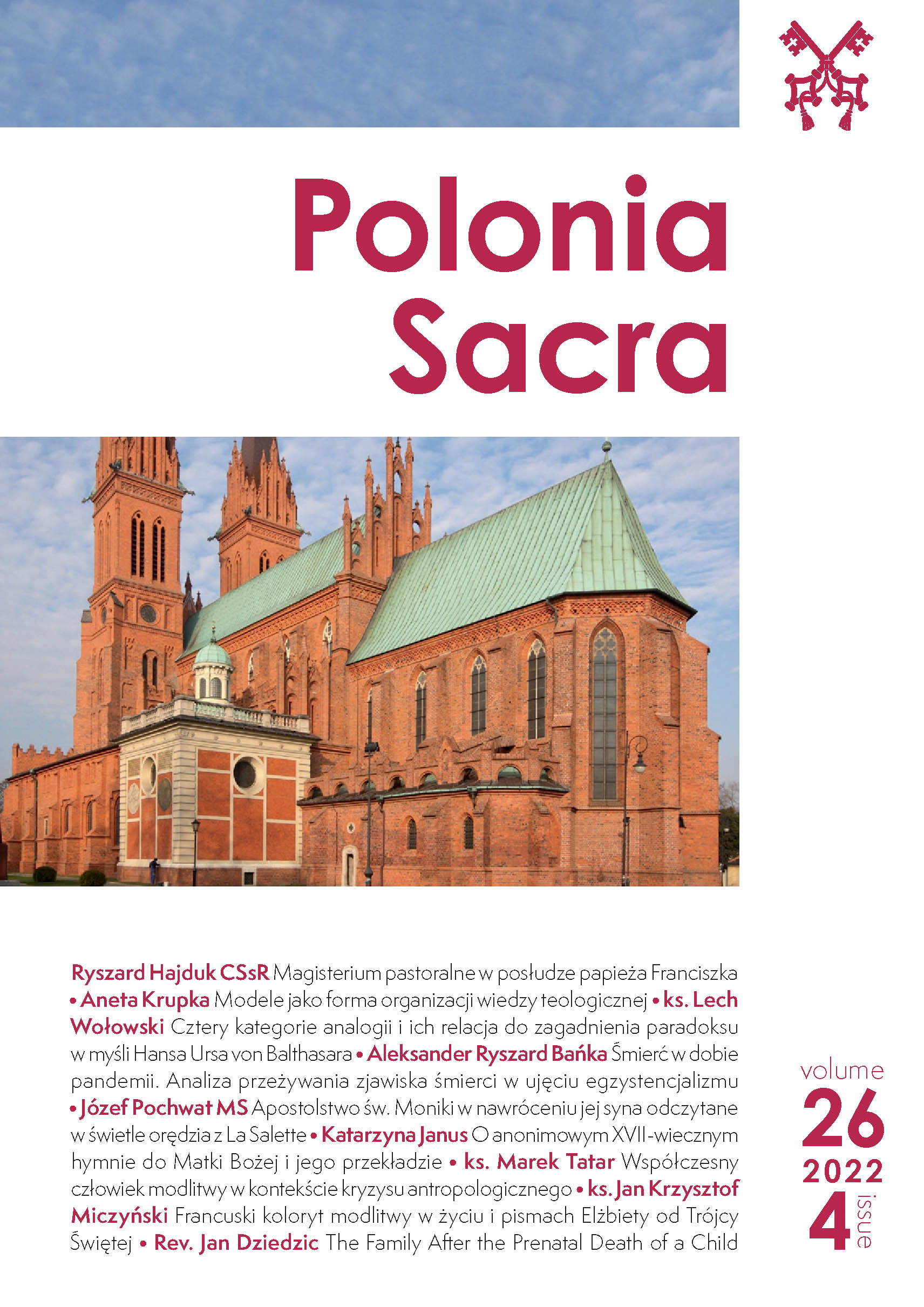Four Categories of Analogy and their Relation to the Problem of Paradox in the Thought of Hans Urs von Balthasar
DOI:
https://doi.org/10.15633/ps.26403Keywords:
analogy, paradox, BalthasarAbstract
The article examines four categories of analogy in the reflection of Hans Urs von Balthasar: analogia entis, analogia fidei, analogia libertatis and analogia caritatis. Each of these categories has been analyzed in the perspective of the accompanying paradoxes: the paradox of unitymultiplicity (incommunicability-communicability), the paradox of universale concretum, the paradox of finite and infinite freedom, the paradox of the cross and of the descent into hell. The principle of analogy has been confronted here with the method of perceiving the paradox and the mystery related to it. Each of the above problems has been discussed taking into account the sources of Balthasar’s thought (Anselm, Przywara, Barth, de Lubac, von Speyr) and with particular emphasis on his original reflection. This allows for a conclusion about the central place of the analogy of love in Balthasar’s crowning work called The Trilogy.
References
Balthasar H. U. von, Chwała. Estetyka teologiczna, t. 2: Modele teologiczne, cz. 1: Od Ireneusza do Bonawentury, Kraków 2007.
Balthasar H. U. von, Teodramatyka, t. 2: Osoby dramatu, cz. 1: Człowiek w Bogu, Kraków 2006.
Balthasar H. U. von, Teodramatyka, t. 2: Osoby dramatu, cz. 2: Osoby w Chrystusie, Kraków 2006.
Balthasar H. U. von, Theodramatik, Bd. 3: Die Handlung, Einsiedeln 1980.
Balthasar H. U. von, Theodramatik, Bd. 4: Das Endspiel, Einsiedeln 1983.
Balthasar H. U. von, Teologika, t. 1: Prawda świata, Kraków 2004.
Balthasar H. U. von, The Theology of Henri de Lubac, San Francisco 1991.
Balthasar H. U. von, The Theology of Karl Barth, San Francisco 1992.
Balthasar H. U. von, O moim dziele, Kraków 2004.
Balthasar H. U. von, W pełni wiary, red. M. Kehl, W. Löser, Kraków 1991.
Budzik S., Dramat odkupienia. Kategorie dramatyczne w teologii na przykładzie R. Girarda, H. U. von Balthasara i R. Schwagera, Tarnów 1997.
Guerriero E., Hans Urs von Balthasar. Monografia, Kraków 2004.
Kraus G., Nauka o łasce — Zbawienie jako łaska, Kraków 1999.
Lochbrunner M., Analogia Caritatis. Darstellung und Deutung der Theologie Hans Urs von Balthasars, Freiburg–Basel–Wien 1981.
Lubac H. de, O naturze i łasce, Kraków 1986.
Lubac H. de, Paradoksy i Nowe paradoksy, Kraków 1995.
Migne J. P., Patrologiae Cursus Completus. Series Latina, vol. 159, Paris 1854.
Palakeel J., The Use of Analogy in Theological Discourse. An Investigation in Ecumenical Perspective, Roma 1995.
Przywara E., Schriften, Bd. 3: Analogia entis. Metaphysik: Ur-Struktur und All-Rhytmus, Hrsg. H. U. von Balthasar, Freiburg 1996.
Raczyński-Rożek M., „Analogia entis” Ericha Przywary jako model myślenia katolickiego w postmodernistycznej rzeczywistości, „Teologia w Polsce” 12 (2018) nr 2, s. 215–231.
Schmitt F. S., S. Anselmi Cantuariensis archiepiscopi Opera omnia, vol. 2, Roma 1940.
Schmitt F. S., S. Anselmi Cantuariensis archiepiscopi Opera omnia, vol. 3, Edinburgh 1944.
Wołowski L., L’approccio agatologico-cristologico al concetto di persona nella riflessione teatrologica-teologica di Hans Urs von Balthasar e di Józef Tischner, „Polonia Sacra” 23 (2019) nr 1, s. 31–51.
Wołowski L., The Paradox of Freedom in the Theodramatic Reflection of Hans Urs von Balthasar against the Background of the Thought of Henri de Lubac and Józef Tischner, „Verbum Vitae” 40 (2022) nr 2, s. 303–333.
Downloads
Published
Issue
Section
License

This work is licensed under a Creative Commons Attribution 4.0 International License.
Authors who publish in this journal agree to the following terms:
- Authors retain the copyright and full publishing rights without restrictions and grant the journal right of first publication with the work simultaneously licensed under a Creative Commons Attribution 4.0 International License that allows others to share the work with an acknowledgement of the work's authorship and initial publication in this journal.
- Authors are able to enter into separate, additional contractual arrangements for the non-exclusive distribution of the journal's published version of the work (e.g., post it to an institutional repository or publish it in a book), with an acknowledgement of its initial publication in this journal.
- Authors are permitted and encouraged to post their work online (e.g., in institutional repositories or on their website) prior to and during the submission process, as this can lead to productive exchanges, as well as earlier and greater citation of published work (See The Effect of Open Access).

